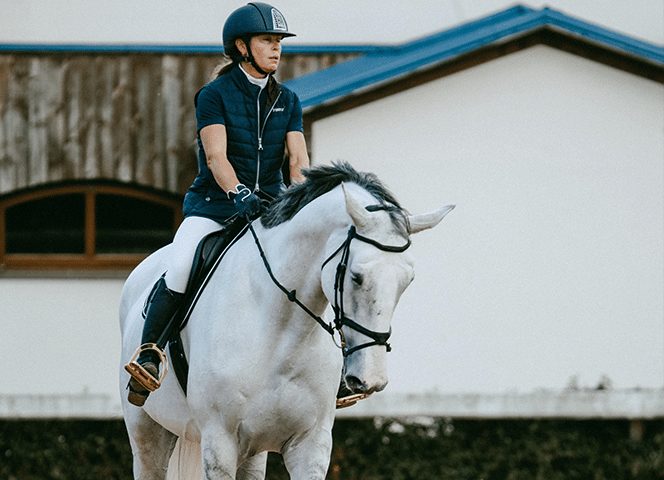It can take a lot to bully an equestrian. And it happens a lot. The unwanted, unhelpful comments made on a livery yard soon escalate. I’ve seen grown women pounce upon younger women and start the psychological games. If you’re experiencing it now, what can you do?
Bullying of any kind is a repeated action, whether directly to someone’s face, or indirect – the kind where a person may be excluded from events or conversations; it can also be talking behind someone’s back.
There is a disempowerment of the victim, which empowers the bully.
Whilst campaigns such as ‘Not on My Yard’ in 2016 helped enormously with awareness, bullying just won’t go away.
In 2017, Irish equestrian Susan Oakes who holds the world side-saddle puissance and triple bar jumping records – not a lady easily intimidated, I’d say – said, “I went down some roads so dark that I didn’t think there would be a tomorrow. At night, I actually prayed that I wouldn’t wake up the next morning.” Susan was horrendously harassed and bullied by horse dealers.
Some riders being bullied feel a need to alter their routines to avoid certain people and situations. They lock up their feed and tack, or take their belongings home. Sometimes, they feel a need to ride at unusual times and even stop going to certain shows.
Let’s look at the 5 common bullies for the everyday rider and what’s behind their behaviour:
- Livery yard expert. They have all the so-called expertise, which is at least 10 years out of date. They eschew anything new, anything not done their way. They know all the correct feeds, tack, training, riding methods and will talk about you to your face or behind your back about what you’re doing wrong. These bullies can make your life a misery – you might feel inferior and like you’re walking on eggshells all the time.
These bullies are insecure and, for some, they can only operate by having others join them. Usually, the others don’t want to incur their wrath, so they agree with this queen bee. The queen bee herself has many areas of life that she struggles with. Her only refuge is the security of horses and having some knowledge of them. By challenging her way of doing things, simply by doing something different, you may have challenged her crown indirectly. Notice whether this bully can actually cut it in the areas they seem to be an expert in. Usually, they have some major flaws that they’re very adept at covering up.
- The horse welfare bullies. Those who pretend (whether consciously or unconsciously) that they are only concerned with the welfare of the horse. They mask their bullying behind a false concern for how you are looking after or training your horse. They come in several guises, claiming to know about something like natural horsemanship. They make you feel that what you are doing is cruel and force you to follow their advice, going against your gut feelings.
The bully again, likes to be an expert. Their minds are often closed. When I first transitioned my horse to barefoot, my trimmer asked me if I’d had negative remarks (I was on a traditional competition /livery yard). Luckily, the girls on that yard were always very supportive and non-judgmental; but you may find that if you try something new, this bully mocks you for it. The horse welfare bully is simply the expert bully who hides behind an excuse, making them look helpful. Once again, they elevate their own opinions of themselves by thinking that others are inferior. This is classic of insecure people.
- The instructor bully. This one speaks for itself. The instructor or trainer whose approach is from the 1950s will already be aware of their misdemeanours. They were probably bullied whilst being trained themselves. They now have little more than an old reputation as a successful rider. They live vicariously through their riders. Their frustrations at not making it, not going up the levels and rankings as highly as they should or could have are heavy millstones around their neck. This one is easy to deal with – vote with your feet and stop the lessons!
- The cyberbully. The ultimate coward who cannot help but criticise those who are having a go, even those who rise to international stardom. These bullies are jealous and do not have the mind resources to create opportunities for themselves. They are stuck feeling that they could do better, without ever taking steps to change and have a go themselves. Notice how they can comment anonymously on some platforms now – how different it would be if they criticised in real life.
- The racist, homophobic or anti-special needs bully. Clearly, this is borne out of bigotry, which, in its most empirical form is borne out of a fear of someone different.
It’s a cliché, but completely true, that bullies are missing something from their own psyche. They are insecure and often scared. It’s been found that bullies are more almost twice as likely to have anxiety, depression or ADHD and may have anger issues https://abcnews.go.com/Health/Wellness/bullies-mental-health-disorder/story?id=17518230#:~:text=Those%20who%20were%20considered%20the,anxiety%20and%20attention%20deficit%20disorder.
What to do about being bullied: disempower the bully.
- Follow the 3 Rs –
-
- Recognise the bullying (you’re not to blame, this is not your fault, there is nothing in your personality that has led to the bullying).
- Report it to someone.
- Refuse to enter into it as a victim.
- Let other people know. Having someone listen to you and support you is incredibly helpful. They can be a cheerleader for you, when you need it. This can be on- or off-line.
- Block the bullies online! Report them to the admins.
- Appear neutral to them. Be a Switzerland! When you react to their comments, they feel a little victory. Appear neutral. Then chat to a friend about it to get it out of your system.
- If you can, walk away from them as they are speaking. Avoid turning around, keep walking and count 100 paces. Imagine you’re walking away from a stranger.
- If they follow you, take a deep breath and say, “Why are you speaking to me?” or, “Does saying those things give you a kick? I find them a bit boring now.” A bully will tire of someone who gives as good as they get.
- Imagine their voice as distorted and slowed down to a quarter of the speed.
- Perception is projection. This means that what someone throws at you (their nasty remarks, their sneering face), is actually how they are addressing themselves, they are showing you their own flaws. If you b
know that they are really talking about themselves, it’s is very empowering for you!
- Neurolinguistic programming tells us that everyone is doing the best they can with the (mind) resources they have available. If they are bullying you, doesn’t that mean their resources are severely lacking? Empower yourself knowing this.
- Keep a virtual scrapbook or Pinterest board with all the positive comments you receive, however small. Add in photos or videos of every little success, again no matter how small. Chart your progress in your riding and horsemanship. Look over this any time you have a negative comment on social media or feel bad.
Further reading
#Notonmyyard campaign by Tudor Rose Equine https://www.facebook.com/notonmyyard
Susan Oakes’ world record puissance https://equusmagazine.com/blog-equus/equestrian-bullying-horse-words-hurts-54948
More about NLP https://www.traceycolenlp.com/nlp/
Bullies and their mental health https://abcnews.go.com/Health/Wellness/bullies-mental-health-disorder/story?id=17518230#:~:text=Those%20who%20were%20considered%20the,anxiety%20and%20attention%20deficit%20disorder.
This post was written by Tracey Cole, Mindset Therapy & Coaching.





